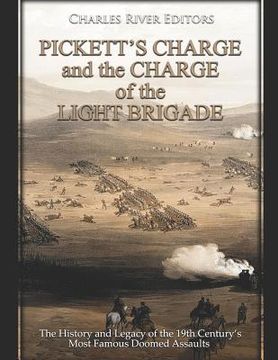Pickett's Charge and the Charge of the Light Brigade: The History and Legacy of the 19th Century's Most Famous Doomed Assaults (en Inglés)
Reseña del libro "Pickett's Charge and the Charge of the Light Brigade: The History and Legacy of the 19th Century's Most Famous Doomed Assaults (en Inglés)"
*Includes pictures*Includes accountsDespite the fact that the Civil War began over 150 years ago, it remains one of the most widely discussed topics in America today, with Americans arguing over its causes, reenacting its famous battles, and debating which general was better than others. Americans continue to be fascinated by the Civil War icons who made the difference between victory and defeat in the war's great battles. The most famous attack of the Civil War was also one of its most fateful and fatal. Pickett's Charge, the climactic assault on the final day of the Battle of Gettysburg, has become the American version of the Charge of the Light Brigade, and it is one of the most famous events of the entire Civil War. Having been unable to break the Army of the Potomac's lines on the left and right flank during Day 2 of the Battle of Gettysburg, Confederate Army of Northern Virginia commander Robert E. Lee decided to make a thrust at the center of the Union's line with about 15,000 men spread out over three divisions. The charge required marching across an open field for about a mile, with the Union artillery holding high ground on all sides of the incoming Confederates. Aware of the insanity of sending 15,000 men hurtling into all the Union artillery, Lee planned to use the Confederate artillery to try to knock out the Union artillery ahead of time. Although old friend William Pendleton was the artillery chief, the artillery cannonade would be supervised by Edward Porter Alexander, Longstreet's chief artillerist, who would have to give the go-ahead to the charging infantry because they were falling under Longstreet's command. Alexander later noted that Longstreet was so disturbed and dejected about ordering the attack that at one point he tried to make Alexander order the infantry forward, essentially doing Longstreet's dirty work for him. Unfortunately for Porter Alexander and the Confederates, the sheer number of cannons belched so much smoke that they had trouble gauging how effective the shells were. As it turned out, most of the artillery was overshooting the target, landing in the rear of the Union line. Reluctant to order the charge, Longstreet commanded Porter Alexander to order the timing for the charge. As Longstreet and Alexander anticipated, the charge was an utter disaster, incurring a nearly 50% casualty rate and failing to break the Union line. The Charge of the Light Brigade is the most famous British cavalry charge in history, possibly also eclipsing the renown of any other mounted attack conducted by the armed forces of other nations in the general imagination. This cavalry action is certainly remembered far more vividly than the 1854 Battle of Balaclava during which it occurred, and even the wider Crimean War that led to the battle. Of course, the prominence of the Charge in popular and historical memory is due primarily to Alfred, Lord Tennyson's poem describing the events of that distant late October afternoon. The bearded Poet Laureate crafted a powerful, gripping poetic narrative that fixed the encounter firmly in both the popular imagination and in the English literary oeuvre. Millions of people who know nothing else of the Crimean War between Great Britain and the Russian Empire are familiar with Tennyson's memorable verses: Powerful as this vision of buffoonish commanders leading soldiers infused with ant-like obedience may be in the world of poetry, considerable documentation still exists which at least partially refutes such an interpretation. These documents, recently revisited by a handful of historians, greatly diminish the role of upper-echelon mistakes in causing the Charge. They restore agency and initiative to the ordinary British soldiers, highlighting them as fierce, independent-minded, and energetic actors in their own right, who very nearly changed the outcome

